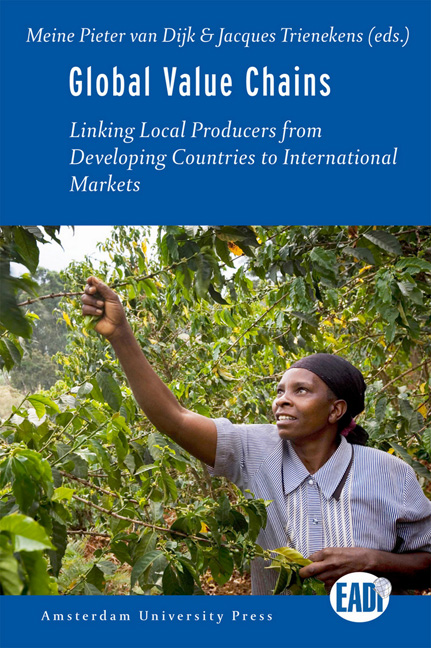Book contents
- Frontmatter
- Contents
- Part I Theoretical Contributions
- Part II Local Agricultural Value Chains
- Part III International Agricultural Value Chains
- Part IV Value Chains in the Industrial and Services Sector
- Part V Conclusions: Upgrading Value Chains in Developing Countries
- About the Authors
- Index
- Miscellaneous Endmatter
1 - Global Value Chains: An Overview of the Issues and Concepts
- Frontmatter
- Contents
- Part I Theoretical Contributions
- Part II Local Agricultural Value Chains
- Part III International Agricultural Value Chains
- Part IV Value Chains in the Industrial and Services Sector
- Part V Conclusions: Upgrading Value Chains in Developing Countries
- About the Authors
- Index
- Miscellaneous Endmatter
Summary
Introduction
Global value chains are about linking local producers from developing countries to international markets. They link the raw-material producer and the final consumer. Which organizations are involved in this process and how important are they? According to a Chinese consultant quoted in the Chinese journal China: “Processing on order will only land a company at the bottom end of the industrial chain”. However, “developing a full range of products under a respected brand puts a producer in a different league from traditional manufacturers” (October 2010: 29). This is “trying to climb the value chain” or “progression up the economic value chain”. This is also what “upgrading value chains” is all about and in this book seven case studies of developing local and global value chains are presented from that angle. The book provides a combination of theoretical and empirical studies, which may inspire other researchers to develop more case studies in this important field of research, using the theoretical insights presented in the different chapters. We start with two theoretical chapters concerning global value chains, besides this introductory chapter.
In this chapter we discuss the issues concerning the development of global value chains. The case of biofuels will be taken as an example since it is a relatively new value chain and a large number of issues related to value chain development play a role. The case will come back in chapter 5. Then a number of important theoretical concepts concerning value chains are discussed, before giving an overview of the book.
Biofuel chains start in developing countries
Many African countries are setting ambitious production targets for value chains and provide support both at country and regional level for these initiatives. Biofuels are a good example. The conditions for growing biofuels are good in many African countries. Most countries have a good climate, good soils, abundant land (e.g. only 14% of arable land in Zambia is currently under cultivation) and an enormous potential market exists at national and international level. A division of labor is possible between the local/village level (the farm activities), the national level (transport and manufacturing of fuels) and finally the international level, where biofuel has to help countries to meet the high renewable energy targets, for example in Europe and the United States.
Information
- Type
- Chapter
- Information
- Global Value ChainsLinking Local Producers from Developing Countries to International Markets, pp. 9 - 30Publisher: Amsterdam University PressPrint publication year: 2012
Accessibility standard: Unknown
Why this information is here
This section outlines the accessibility features of this content - including support for screen readers, full keyboard navigation and high-contrast display options. This may not be relevant for you.Accessibility Information
- 2
- Cited by
